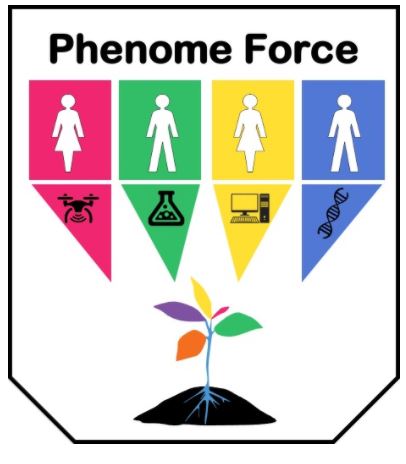
A unique platform where experts & novices can easily connect & exchange knowledge & resources are a priority. Fostering communication & cooperation among different stakeholders as well as promoting the interdisciplinary training required for effective plant phenotyping research are among the main purposes of this group
Welcome to PhenomeForce
During the last decade, plant phenomics has grown enormously as a research field in agriculture. With incredible technological advancements in computer vision tools, plant phenomics has found many applications, including, for instance, plant species recognition, plant stress quantification, and crop yield prediction. These various applications of plant phenomics have evolved into multiple specialized niches involving national, international, and multi-disciplinary experts (e.g., plant physiologist, breeders, engineers, informatics, etc.). In the meantime, plant phenomics is increasingly accessible to a larger number of researchers worldwide thanks to the introduction of new, cost-effective setups, adaptable phenotyping platforms, and the emergence of open-source image processing software.
With the growing interest in plant phenomics, a unique platform where experts and novices can easily connect and exchange knowledge and resources are a priority. Fostering communication and cooperation among different stakeholders as well as promoting the interdisciplinary training required for effective plant phenotyping research are among the main purposes of our group.
This group is a platform imagined as an interactive “ metabolic network ”, where the nodes represent the different areas of plant phenomics applications, along with their sub-communities of experts. The main purpose is to provide all the knowledge essential to plan and start your own project of plant phenomics, making phenomics easy for everybody.
This platform will contribute to the goals of Digital Agriculture:
-
Bringing together a broad network of experts to share information on data and data science-related projects, collaborations, tools, practices, and discoveries.
-
(2) Building partnerships and resources that address emerging issues and discuss challenges and opportunities in agriculture using novel approaches from diverse disciplines.
Fridays Hands-On: A Workshop Series in Data+Plant Sciences
An online and free workshops where invited specialists will introduce the different applications and approaches in plant phenomics. The main focus of the proposed series of workshops, called “Fridays Hands-On Workshop Series,” will be data management and analysis - often the most challenging part of digital phenotyping. Each workshop will include a short theoretical introduction followed by practical data analysis, where the instructors will guide the audience through available and open-source data, tools, and codes.
Registration: https://forms.gle/SAmPXZXP8BfYW6gDA
| Speakers | Date | Workshop |
|---|---|---|
| Atena Haghighattalab | 29/Oct | Implementation of high throughput phenotyping pipelines on large plant breeding programs |
| Chongyuan Zhang | 5/Nov | Crop trait phenotyping in plant breeding programs using UAS and feature extraction pipeline |
| Zhou Zhang | 12/Nov | Alfalfa yield and quality prediction using UAV-based hyperspectral imagery |
| Jinha Jung | 19/Nov | How to share UAS data using public clouds |
| Margaret Kruase | 03/Dec | Predicting grain yield with aerial hyperspectral reflectance data |
| Ce Yang & Tyler Nigon | 10/Dec | An automated approach for spatial cropping and plot identification of hyperspectral aerial imagery used in small-plot and on-farm research |
| Alper Adak | 17/Dec | UAV pipeline for image and data analysis using R tools |
Preparing for the next workshop:
YouTube Tutorial
New videos coming soon…
Slack Channel
PhenomeForce Slack Channel is a single place for our community to share messages, tools, pipelines, and files. All main areas of plant phenotyping are being covered by specialists enthusiastic to share their knowledge. If you are interested to be part of this group, please send a message to phenomeforce@gmail.com.
Contact
- Annarita Marrano (annarita.marrano@umb.edu)
- Filipe Matias (fmatias@wisc.edu)
- GitHub
Support and Acknowledgments
